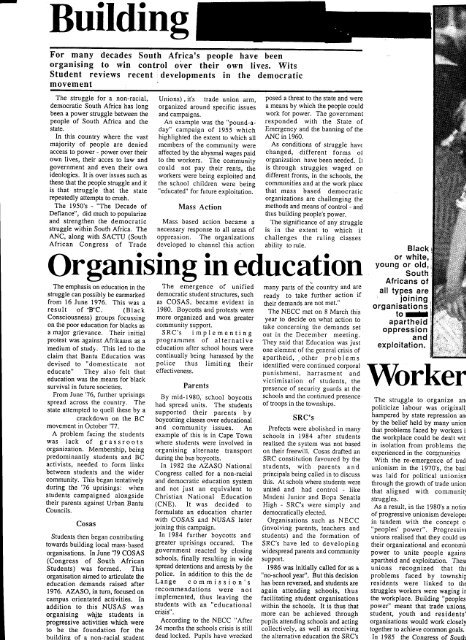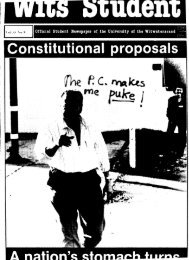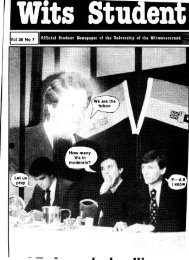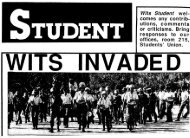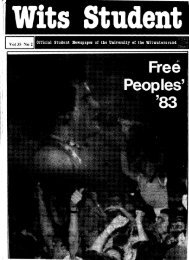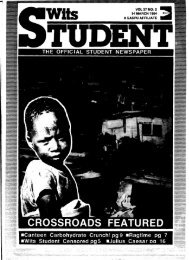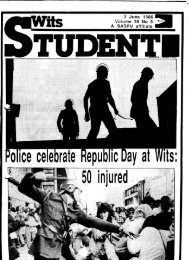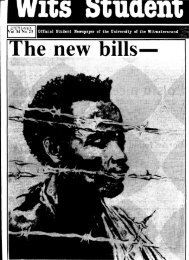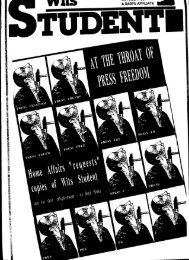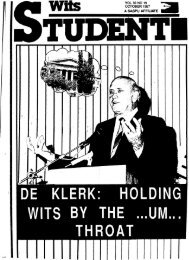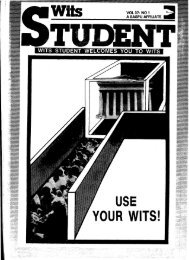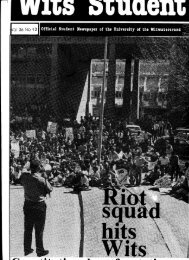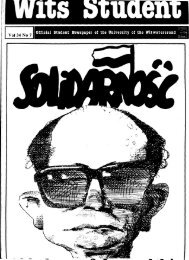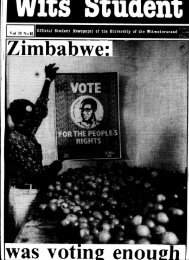emergency - Computer Science
emergency - Computer Science
emergency - Computer Science
Create successful ePaper yourself
Turn your PDF publications into a flip-book with our unique Google optimized e-Paper software.
Building<br />
For many decades South Africa's people have been<br />
organising to win control over their own lives. Wits<br />
Student reviews recent developments in the democratic<br />
movement<br />
The struggle for a non-racial,<br />
democratic South Africa has iong<br />
been a power struggle between the<br />
people of South Africa and the<br />
state.<br />
In this country where the vast<br />
majority of people are denied<br />
access to power - power over their<br />
own lives, their acces to law and<br />
government and even their own<br />
ideologies. It is over issues such as<br />
these that the people struggle and it<br />
is that struggle that the state<br />
repeatedly attempts to crush.<br />
The 1950's - "The Decade of<br />
Defiance", did much to popularize<br />
and strengthen the democratic<br />
struggle within South Africa. The<br />
ANC, along with SACTU (South<br />
African Congress of Tiade<br />
Unions) , it's trade union arm.<br />
organized around specific issues<br />
and campaigns.<br />
An example was the "pound-aday"<br />
campaign of 1955 which<br />
highlighted the extent to which all<br />
members of the community were<br />
affected by the abysmal wages paid<br />
to tlre workers. The communitv<br />
could not pay their rents, thl<br />
workers were being exploited and<br />
the school children were being<br />
"educated" for future exploitation.<br />
posed a threat to the state and were<br />
a means by which the people could<br />
work for power. The government<br />
responded with the State of<br />
Emergency and the banning of the<br />
ANC in 1960.<br />
As conditions of struggle havr<br />
changed, different forms ol<br />
organization have been needed. It<br />
is through struggles waged on<br />
different fronts, in the schools, the<br />
communities and at the work olace<br />
that rnass based demociatic<br />
organizations are challenging the<br />
Mass Action<br />
methods and means of control - and<br />
thus building people's power.<br />
Mass based action became a The significance of any struggle<br />
necessary response to all areas of is in the extent to which it<br />
oppression. The organizations challenges the ruling classes<br />
developed to channel this action ability to rule.<br />
Organising in education<br />
The emphasis on education in the The emergence of unified<br />
struggle can possibly be earmarked democratic student structures, such<br />
from 16 June 1976. This was a<br />
result of -B'C. (B I ack<br />
Consciousness) groups focussing<br />
on the poor education for blacks as<br />
a major grievance. Their initial<br />
protest was against Afrikaans as a<br />
'medium of study. This led to the<br />
claim that Bantu Education was<br />
devised to "domesticate not<br />
educate" They also felt that<br />
education was the means for black<br />
survival in future societies.<br />
From June '76, further uprisings<br />
spread across the country. The<br />
state attempted to quell these by a<br />
crackdown on the BC<br />
movement in October'77.<br />
A problem facing the students<br />
was lack of grassroots<br />
organization. Membership, being<br />
predominantly students and BC<br />
activists, needed to form links<br />
between students and the wider<br />
community. This began tentatively<br />
during the '76 uprisings: when<br />
students campaigned alongside<br />
their parents against Urban Bantu<br />
Councils.<br />
Cosas<br />
as COSAS, became evident in<br />
1980. Boycotts and protests were<br />
more organized and won greater<br />
community support.<br />
SRC's implementing<br />
programmes of alternative<br />
education after school hours were<br />
continually being harassed by the<br />
police thus limiting their<br />
effectiveness.<br />
Parents<br />
By mid-1980, school boycotts<br />
had spread units. The students<br />
supported their parents by<br />
boycotting classes over educational<br />
and community issues. An<br />
example of this is in Cape Town<br />
where students were involved in<br />
organising alternate transport<br />
during the bus boycotts.<br />
In 1982 the AZASO National<br />
Congress called for a non-racial<br />
and democratic education system<br />
and not just an equivalent to<br />
Christian National Education<br />
(CNE). It was decided to<br />
formulate an education charter<br />
with COSAS and NUSAS later<br />
joining this campaign.<br />
In i984 further boycotts and<br />
greater uprisings occured. The<br />
government reacted by closing<br />
Students then began contributing<br />
towards building local mass-based<br />
organisations. In June<br />
'79 COSAS<br />
(Congress of South African<br />
schools, finally resulting in wide<br />
Students) was formed. This spread detentions and anests by the<br />
police.<br />
organisation aimed to articulate the<br />
In addition to this the de<br />
education demands raised after<br />
Lange commission's<br />
1976. AZASO, in turn, focused on<br />
recommendations were not<br />
campus orientated activities. In<br />
implemented, thus leaving the<br />
addition to this NUSAS was students with an "educational<br />
organising whiJe students in crisis".<br />
progressive activities which were According to the NECC "After<br />
to be the foundation for the 24 months the schools crisis is still<br />
buildine of a non-racial<br />
dead locked. Pupils have wrecked<br />
many parts of thb countrY and are<br />
ready to take further action if<br />
their demands are not met."<br />
The NECC met on 8 March this<br />
year to decide on what action to<br />
take concerning the demands set<br />
out in the December meeting.<br />
They said that Education was just<br />
one eiement of the general crisis of<br />
apartheid, . other problems<br />
identified were continued corporal<br />
punishment, harrasment and<br />
victimisation of students, the<br />
presence of security guards at the<br />
schools and the continued presence<br />
of hoops in the townships.<br />
SRC's<br />
Prefects were abolished in many<br />
schools in 1984 after students<br />
realised the system was not based<br />
on their freewill. Cosas drafted an<br />
SRC constitution favoured by the<br />
students, with parents a n d<br />
principals being called in to discuss<br />
this. At schols where studenls were<br />
united and had control - like<br />
Mndeni Junior and Bopa Senatla<br />
High - SRC's were simply and<br />
democratically elected.<br />
Organisations such as NECC<br />
(involving parents, teachers and<br />
students) and the formation of<br />
SRC's have led to developing<br />
widespread parents and community<br />
support.<br />
i986 was initiall-y called for as a<br />
"no-school year". But this decision<br />
has been reversed, and students are<br />
again attending schools, thus<br />
facilitating student organisations<br />
within the schools. It is thus that<br />
more can be achieved through<br />
pupils attending schools and acting<br />
collectively, as well as receiving<br />
the alternative education the SRC's<br />
Black<br />
or white,<br />
young or old,<br />
South<br />
Africans of<br />
all types are<br />
joining<br />
organisations<br />
toll<br />
apartheid<br />
oppression<br />
dnd ll ro<br />
exploitation. ll,t<br />
Vtbrker<br />
The struggle to organize an<br />
poiiticize labour was originall<br />
hampered by state repression an<br />
by the belief held by many union<br />
that problems faced by workers i<br />
the workplace could be dealt wif<br />
in isolation from problems the<br />
experienced in the cor4munities<br />
With the re-emergence of trad<br />
unionism in the 1970's. the bas<br />
was laid for political unionisn<br />
through the growth of hade union<br />
that aligned with communit<br />
struggles.<br />
As a result, in the 1980's a notio<br />
of progressive unionism develope<br />
in tandem with the concept o<br />
"peoples' power". Progressiv<br />
unions realised that they could us<br />
their organizational and economi<br />
power to unite people agains<br />
apartheid and exploitation. Thes<br />
unions recognized that thr<br />
problems faced by township<br />
residents were linked to thr<br />
struggles workers were waging ir<br />
the workplace. Building "peoples<br />
power" meant that hade unions<br />
student, youth and residents<br />
organisations wouid work closely<br />
together to achieve common goals.<br />
In 1985 the Congress of


